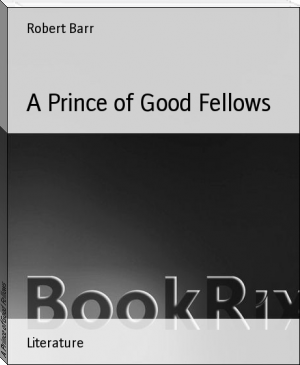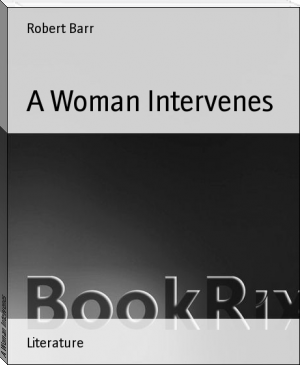A Prince of Good Fellows - Robert Barr (recommended reading txt) 📗

- Author: Robert Barr
Book online «A Prince of Good Fellows - Robert Barr (recommended reading txt) 📗». Author Robert Barr
"In intercepting my venison, Buchanan," continued the king with the utmost politeness, "you were actuated by one of two motives. Your intervention was either an insult to the king, or it was an intimation that you desired to become his cook. In which light am I to view your action, Buchanan?"
There was in the king's voice a sinister ring as he uttered this sentence that belied the smile upon his lips, and apprehension deepened as all present awaited Buchanan's reply. At the word "cook," he had straightened himself, and a deeper flush than the wine had left there, overspread his countenance; now he bowed with deference and said,--
"It has ever been my ambition to see your majesty grace with his presence my humble board."
"I was sure of it," cried James with a hearty laugh which brought relief to the anxious hearts of many standing before him. The king thrust his sword into a scabbard, and, with a clangour of hilt on iron, those behind him followed his example.
"And now," cried James, "let the king's men eat while the laird's men wait upon them. And as for you, John Buchanan, it is to-day my pleasure that you have the honour of being my cup-bearer."
Whether the honour thus thrust upon the Laird of Arnprior was as much to his liking as an invitation to sit down with his guest would have been, is questionable, but he served his majesty with good grace, and the king was loud in his praise of the venison, although his compliments fell sadly on the ears of the hungry men who watched it disappear so rapidly. At the end of the feast James rose with his flagon in his hand.
"I give you the king," he cried, "the King of Kippen. When I left Stirling I had made up my mind that there could be but one king in a country, but glorious Scotland shall have no such restriction, and I bestow upon Buchanan, whose ample cheer we have done justice to, the title of King of Kippen, so long as he does not fall into the error of supposing that Kippen includes all of Scotland, instead of Scotland including Kippen. And so, Laird of Arnprior, King of Kippen, we drink your good health, and when next my venison passes your door, take only that portion of it which bears the same relation to the whole, as the district of Kippen does to broad Scotland."
The toast was drunk with cheers, and when silence came, the King of Kippen, casting a rueful glance along the empty board, said,--
"I thank your majesty for your good wishes, but in truth the advice you give will be hard to follow, for I see I should have stolen twice the quantity of venison I did, because as I have not done so, I and my men are like to go hungry."
And thus Buchanan came into his title of King of Kippen, although he had to wait some time for his dinner on the day he acquired the distinction.
THE KING'S TRYST
The king ruled. There was none to question the supremacy of James the Fifth. At the age of twenty-two he now sat firmly on his throne. He was at peace with England, friendly with France, and was pledged to take a wife from that country. His great grandfather, James the Second, had crushed the Black Douglas, and he himself had scattered the Red Douglas to exile. No Scottish noble was now powerful enough to threaten the stability of the throne. The country was contented and prosperous, so James might well take his pleasure as best pleased him. If any danger lurked near him it was unseen and unthought of.
The king, ever first in the chase, whether the quarry ran on four legs or on two, found himself alone on the road leading north-west from Stirling, having outstripped his comrades in their hunt of the deer. Evening was falling and James being some miles from Stirling Castle, raised his bugle to his lips to call together his scattered followers, but before a blast broke the stillness, his majesty was accosted by a woman who emerged suddenly and unnoticed from the forest on his left hand.
"My lord, the king;" she said, and her voice, like the sound of silver bells, thrilled with a note of inquiry.
"Yes, my lassie," answered the young man, peering down at his questioner, lowering his bugle, and reining in his frightened horse, which was startled by the sudden apparition before him. The dusk had not yet so far thickened but the king could see that his interlocutor was young and strikingly beautiful. Although dressed in the garb of the lower orders, there was a quiet and imposing dignity in her demeanour as she stood there by the side of the road. Her head was uncovered, the shawl she wore over it having slipped down to her shoulders, and her abundant hair, unknotted and unribboned, was ruddy as spun gold. Her complexion was dazzlingly fair, her eyes of the deepest blue, and her features perfection, except that her small mouth showed a trifle too much firmness, a quality which her strong but finely moulded chin corroborated and emphasised. The king, ever a connoisseur of womanly loveliness, almost held his breath as he gazed down upon the comely face upturned to him.
"They told me at Stirling," she said, "that you were hunting through this district, and I have been searching for you in the forest."
"Good heavens, girl!" cried the king; "have you walked all the way from Stirling?"
"Aye, and much further. It is nothing, for I am accustomed to it. And now I crave a word with your majesty."
"Surely, surely!" replied the king with enthusiasm, no thought of danger in this unconventional encounter even occurring to him. The natural prudence of James invariably deserted him where a pretty woman was concerned. Now, instead of summoning his train, he looked anxiously up and down the road listening for any sound of his men, but the stillness seemed to increase with the darkness, and the silence was profound, not even the rustle of a leaf disturbing it.
"And who, my girl, are you?" continued the king, noticing that her eyes followed his glance up and down the road with some trace of apprehension in them, and that she hesitated to speak.
"May it please your gracious majesty, I am humble tirewoman to that noble lady, Margaret Stuart, your honoured mother."
The king gave a whistle of astonishment.
"My mother!" he exclaimed. "Then what in the name of Heaven are you doing here and alone, so far from Methven?"
"We came from Methven yesterday to her ladyship's castle of Doune."
"Then her ladyship must have come to a very sudden resolution to travel, for the constable of Doune is in my hunting-party, and I'll swear he expected no visitors."
"My gracious lady did not wish Stuart the constable to expect her, nor does she now desire his knowledge of her presence in the castle. She commanded me to ask your majesty to request the constable to remain in Stirling, where, she understands, he spends most of his time. She begs your majesty to come to her with all speed and secrecy."
"I wonder what is wrong now?" mused the king. "I have not heard from her for nearly a year. She has quarrelled with her third husband, I suppose, for the Tudors are all daft where matrimony is concerned."
"What does your majesty say?" asked the girl.
"I was speaking to myself rather than to you, but I may add that I am ready to go anywhere if you are to be my guide. Lend me your hand and spring up here behind me. We will gallop to Doune at once."
The young woman drew back a step or two.
"No, no," she said. "The Lady Margaret is most anxious that your visit should be unknown to any but herself, so she begs you to dismiss your followers and lay your commands upon Constable Stuart of Doune."
"But my followers are all of them old enough to look after themselves," objected the king, "and the constable is not likely to leave Stirling where he has remained these many months."
"The Lady Margaret thought," persisted the girl, "that if your retinue returned to Stirling and learned of your continued absence, anxiety would ensue, and a search might be undertaken that would extend to Doune."
"How did my lady mother know I was hunting when you could not have learned of my excursion until you reached Stirling?" asked the king, with a glimmer of that caution which appeared to have deserted him.
The girl seemed somewhat nonplussed by the question, but she answered presently with quiet deliberation,--
"Her ladyship was much perturbed and feared I should not find you at the castle. She gave me various instructions, which she trusted I could accommodate to varying contingencies."
"My girl," said the king leaning towards her, "you do not speak like a serving-maid. What is your name?"
"I have been a gentlewoman, sire," she answered simply, "but women, alas, cannot control their fortunes. My name is Catherine. I will now forward to Doune, and wait for you at the further side of the new bridge the tailor has built over the Teith. If you will secure your horse somewhere before coming to the river, and meet me there on foot, I will conduct you to the castle. Will you come?"
"Of a surety," cried the king, in a tone that left no doubt of his intentions. "I shall overtake you long before you are at the bridge!" As he said this the girl fled away in the darkness, and then he raised his bugle to his lips and blew a blast that speedily brought answering calls.
James's unexplained absences were so frequent that his announcement of an intention not to return home that night caused no surprise among his company; so, bidding him good-night, they cantered off towards Stirling, while he, unaccompanied, set his face to the north-west, and his spurs to the horse's flanks, but his steed was already tired out and could not now keep pace with his impatience. To his disappointment, he did not overtake the girl, but found her waiting for him at the new bridge, and together they walked the short half mile to the castle. The young man was inclined to be conversational, but the girl made brief replies and finally besought his silence.
The night had proved exceedingly dark, and they were almost at the castle before its huge bulk loomed blackly before them. There was something so sinister in its dim, grim contour that for the first time since he set out on this night adventure, a suspicion that he was acting unwisely crossed the king's mind.
Still, he meditated, it was his mother's own castle, the constable of which was a warm friend of his--almost, as one might say, a relative, for Stuart was the younger brother of his mother's husband, so what could be amiss with this visit?
"You are not taking me to the main entrance," he whispered.
"No, to the postern door."
"But the postern door is situated in the wall high above my reach; it is intended for the exit of a possible messenger during a siege and not for the entrance of a guest."
"I am





Comments (0)